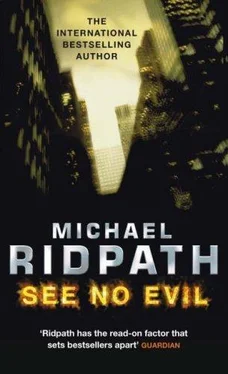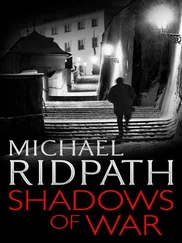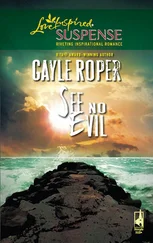Andries could easily have arranged his brother’s acquittal, but he had chosen not to. After all, he still walked with a slight limp from where his big brother had belted him with the flat of a pick axe when he was twelve.
Andries drove up to the house itself, surrounded by an inner fence of twelve-foot-high barbed wire, topped off with three electrified strands. Yellow signs warned of an armed response to intruders. Cattle rustlers these days carried guns. Inside the fence, a modern-day kraal, was an oasis of green irrigated wealth. There were tall trees, poplar and cypress, there was a lush green lawn, there was a swimming pool, and the house itself, a simple low white one-storey affair to which Andries had added two extensions. To one side stood the water tower, a windmill, the labourers’ shacks and, most importantly, the cow sheds. The fences were there to protect the cattle as much as the humans.
Andries was no farmer, but he was immensely proud of his farm. It had been in the family for 160 years. The Visser family had set off from Graaff-Reinet in the Karoo on the Great Trek in the 1830s, had crossed the Drakensberg mountains into Zululand, and then a few years later been ejected by the British and re-crossed the mountains to this spot, forty kilometres from Pretoria. Here they had scratched a living, a God-fearing, hard-working, honest family, struggling against the depredations of poor weather, poor soil and vindictive British colonial administrators. A small, physically weak man with a limp, Andries had found his talents more suited to the needs of government administration in Pretoria, but he never forgot the physical labour and suffering of his ancestors, and now he had retired from government service he was proud to be occupying the same land they had farmed through the generations.
He parked next to a car he recognized, an unprepossessing blue Toyota Corolla. He stubbed out his cigarette in the pot by the stoep. His wife, Hannah, had banned him from smoking indoors a couple of years before. He swung open the security gate guarding the front door and entered the house.
His wife was in the kitchen drinking a cup of coffee with a big, square man with a thick neck, a moustache and close-cropped hair.
‘Kobus! Good to see you,’ Visser said in Afrikaans with a thin smile. ‘Why don’t you bring that through to my study? We need to talk.’
Colonel Kobus Moolman sat stiffly in the chair next to Visser’s desk and sipped his coffee. He was now in his early sixties but he still looked hard. Rock hard. His reputation in the security police had as much to do with his cunning as his ruthlessness. He had served his country in South West Africa, and had been a senior member of the notorious death squad that had tortured and killed dozens if not hundreds of people at Vlakplaas. Visser had had serious doubts when Freddie Steenkamp had suggested him for the Laagerbond, but Freddie had been right. There were times when the bond needed a man like Moolman.
Once away from his wife, Visser’s smile disappeared. ‘What went wrong?’ he said.
‘I must be getting rusty,’ Moolman answered. ‘It was a simple question of not enough explosive. It must have been a stronger aeroplane than I gave it credit for. But the guy’s in a coma, isn’t he? He’s stopped asking questions.’
‘He could snap out of it at any time.’
‘Do you want me to finish him off?’ Moolman asked.
‘In the hospital?’
‘It would be tricky, but if it was necessary...’
Visser stared out of the window, over the veld towards the ravine where the Elands River, almost dry now, wound its way towards the Limpopo and the Indian Ocean 500 kilometres away. His chest was wracked by a cough, and he felt a pain in his shoulder. The cough was getting worse, he really ought to see a doctor about it. ‘No,’ he said. ‘Not while he’s still unconscious. It might just stir up more trouble. The British police know it wasn’t an accident and they have started an investigation. I hope they won’t turn up anything. But I would like you to fly back to London to be on hand in case we need you.’
Moolman nodded. The truth was he much preferred operating on his home turf, even if these days the number of old friends in authority he could rely upon to provide him with assistance was dwindling. But he prided himself on his abilities, he had always been a loyal member of the Laagerbond and he was not about to let them down now.
‘Very well, Andries. You can count on me.’
July 18, 1988
I had lunch with George today in Greenmarket Square. It was raining. On the way I saw a copy of the Financial Times on a newsstand: the front-page story was blacked out. This country is pathetic.
George is really down about the Mail closing. He has been trying to find a buyer without any luck, its losses are just too big. I suggested he approach Graham Pelling to see if he will take the Mail along with the other newspapers. George said he will try, but he doesn’t hold out much hope.
I asked George about Muldergate. It’s ten years since it happened and I’m a bit fuzzy about the details. The Mail was one of the papers that broke the scandal, and George remembered it well. I asked him whether he has heard of the Laagerbond. He hasn’t. He was clearly curious about my questions, and I promised I would tell him more when I could. But not yet. Not until I’ve figured out what’s going on with Neels.
July 20
I am crying as I write this. I have just had a huge fight with Neels. It wasn’t about his woman, I chickened out of talking to him about that. It was about the Laagerbond.
All I did was ask him who they were and he exploded. He demanded to know how I had found out about them. When I told him I had looked in Daniel’s briefcase he was furious. He said I was the lowest of the low, I was scum for spying on him. He said I had no right to pry into his business, he said I wouldn’t understand it anyway, he said I had betrayed him, and I had been disloyal. I fell apart. I burst into tears and ran out of the room into the bedroom.
It’s all so wrong, he’s the one whose being disloyal, he’s carrying on an affair, he’s dealing with these weirdo Boers.
For the first time in our marriage I couldn’t stand up to him, I ran away.
He actually called me “scum.” His own wife. I can’t forgive him for that. Never.
July 21
Neels slept in Todd’s room last night. He got up early to go to work, I heard him. At least he didn’t sneak off in the middle of the night.
Zan and Caroline were very quiet at breakfast. They must have heard the shouting and the tears last night. Poor Caroline! It’s her second day back at school and it’s obvious she’s pleased to be out of the house.
July 22
Spoke to Todd on the phone this evening. I suggested that he come out here for a week at the end of his summer vacation and bring Francesca with him. He seemed to like the idea, but he said he’d have to check with her. I hope he does come.
Neels is working so hard on the Herald deal I scarcely see him. Thank God. He’s going to London tomorrow and then Philadelphia. He says he might be away for three weeks. My feelings toward him are so confused. I’m angry, so angry, about the way he treats me these days and about what he’s done with the Mail. And I’m still sure he’s got another woman hidden away somewhere. I haven’t seen any more signs of it, but I just know it.
But I’m also afraid. The violence that I have always known exists in this country seems to be closing in on me, stealing into my own family. First there was Hennie, then the SACP list, then there are these Laagerbond people. Men that high up in the Afrikaner establishment can only be dangerous. And then there’s Neels. He hasn’t threatened me again directly, but he always looks angry, as if he’s about to explode at any second. I fear that he has changed, but more than that I fear that it is this creeping, all-pervasive violence that is changing him.
Читать дальше












